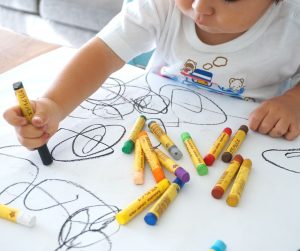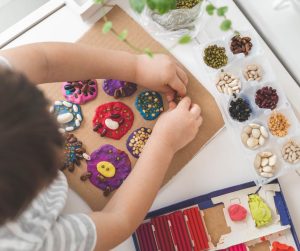Early childhood education is one of the most significant investments you can make in your child’s future. While traditional schooling plays a crucial role, starting early education at home can set a strong foundation for your child’s intellectual, emotional, and social development. Whether you’re a stay-at-home parent, a working parent looking for ways to supplement your child’s education, or simply eager to give your little one a head start, this guide will help you navigate the journey of early childhood education at home.
1. Understand the Importance of Early Childhood Education>
Before diving into specific activities and strategies, it’s essential to understand why early childhood education is so vital. During the first five years of life, a child’s brain develops at an astonishing rate. This period is critical for forming the neural connections that support learning and development in areas such as language, motor skills, problem-solving, and emotional regulation. Engaging your child in educational activities early on can help shape their future success in school and life. apu.apus.edu/area-of-study/education/resources/why-is-early-childhood-education-important-for-children/
2. Create a Learning Environment
Creating a conducive learning environment is one of the first steps in starting early childhood education at home. This doesn’t mean you need to transform your home into a classroom, but having a designated space for learning activities can make a big difference.
Designate a Learning Space: Choose a quiet and comfortable area in your home where your child can focus on educational activities. This space should be free of distractions and filled with materials that encourage exploration and creativity, such as books, puzzles, art supplies, and educational toys.
Organize Learning Materials: Keep educational materials within easy reach and organize them in a way that makes sense for your child. Use shelves, bins, or baskets to store items like books, art supplies, and manipulatives. Rotating toys and materials can keep things fresh and exciting for your child.
Incorporate Technology Wisely: While screen time should be limited, incorporating educational apps and games can enhance your child’s learning experience. Choose age-appropriate content that aligns with your educational goals.
3. Set a Routine
Children thrive on routine, and having a consistent daily schedule can help establish a sense of security and predictability. When setting up your routine, consider including the following:
Morning Activities: Start the day with activities that stimulate your child’s brain, such as reading, singing, or engaging in hands-on activities like building blocks or puzzles.
Structured Learning Time: Dedicate specific blocks of time to structured learning activities, such as practicing letters, numbers, shapes, or simple science experiments. Keep these sessions short and interactive to maintain your child’s interest.
Creative Play: Allow time for creative play, where your child can use their imagination and explore different materials. This could include drawing, painting, playing with clay, or engaging in pretend play.
Outdoor Time: Ensure your child gets plenty of fresh air and physical activity. Outdoor play helps develop gross motor skills and offers opportunities for exploring nature and learning about the environment.
Rest and Relaxation: Incorporate quiet time into your routine for naps or relaxation. This downtime is essential for recharging and processing new information.
4. Focus on Key Areas of Development
Early childhood education should be holistic, covering various aspects of your child’s development. Here are some key areas to focus on:
Language and Literacy: Encourage a love of reading by reading aloud to your child daily. Engage them in conversations, ask open-ended questions, and introduce new vocabulary through stories, songs, and rhymes. You can also practice early writing skills by providing opportunities for drawing and scribbling.
Math and Problem-Solving: Introduce basic math concepts through everyday activities like counting objects, sorting shapes, and identifying patterns. Simple board games and puzzles can also help develop problem-solving skills.
>Social and Emotional Development: Foster social skills by encouraging your child to share, take turns, and express their feelings. Role-playing different scenarios can help them understand and navigate social interactions. Reading books about emotions and discussing characters’ feelings can also be beneficial.
Physical Development: Support your child’s physical development by providing opportunities for both fine and gross motor activities. Fine motor skills can be honed through coloring, cutting with safety scissors, and stringing beads. >Gross motor skills can be developed through running, jumping, climbing, and playing ball games.
5. Encourage Curiosity and Exploration
Children are naturally curious and eager to explore the world around them. Nurturing this curiosity is key to fostering a love of learning. Here are some ways to encourage exploration:
Follow Your Child’s Interests: Pay attention to what your child is interested in and incorporate those topics into your educational activities. If they love dinosaurs, for example, read  books about dinosaurs, create dinosaur crafts, and explore related science concepts.
books about dinosaurs, create dinosaur crafts, and explore related science concepts.
Ask Open-Ended Questions: Encourage critical thinking by asking questions that require more than a yes or no answer. For example, instead of asking, “Did you have fun?” ask, “What was your favorite part of today’s activity, and why?”
Provide Hands-On Learning Opportunities: Children learn best through play and hands-on experiences. Incorporate sensory activities, science experiments, and building projects that allow your child to explore and learn through doing. zerotothree.org/resource/tips-on-nurturing-your-childs-curiosity/
6. Be Patient and Flexible
Every child learns at their own pace, so it’s important to be patient and flexible in your approach. If your child is struggling with a particular concept, try a different method or revisit it later. Remember that the goal is to make learning enjoyable and stress-free.
7. Involve the Whole Family
Learning doesn’t have to be a solo activity. Involve the whole family in your child’s education by playing educational games, cooking meals that involve measuring and counting, or taking nature walks to explore the environment. Siblings can also help teach and model positive behaviors. schola.com/blog/10-best-educational-activities-in-texas-for-your-family
8. Seek Support and Resources
You don’t have to do it all on your own. There are plenty of resources available to support your early childhood education efforts at home. Online platforms offer rich educational content, from printable worksheets to interactive learning games. Local libraries, community centers, and parenting groups can also be valuable sources of information and support. forbes.com/advisor/education/career-resources/online-learning-platforms
Starting early childhood education at home is a rewarding journey that can have a lasting impact on your child’s development. By creating a nurturing and stimulating environment, setting a consistent routine, and focusing on key growth areas, you can lay the groundwork for lifelong learning. Remember to be patient, flexible, and responsive to your child’s needs and interests, and most importantly, enjoy learning together.




